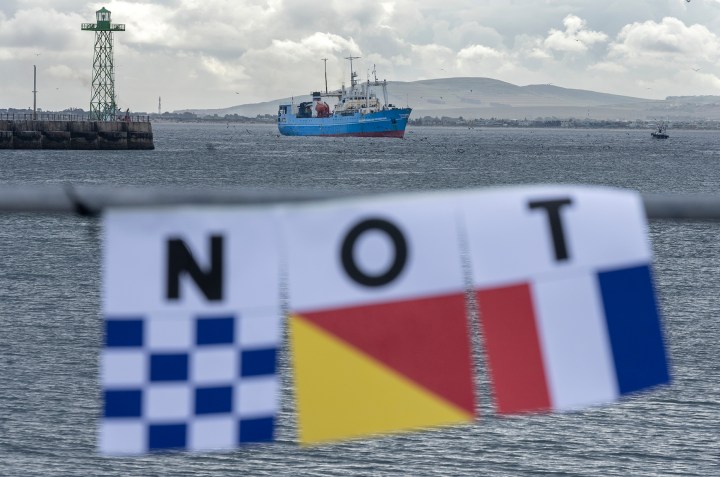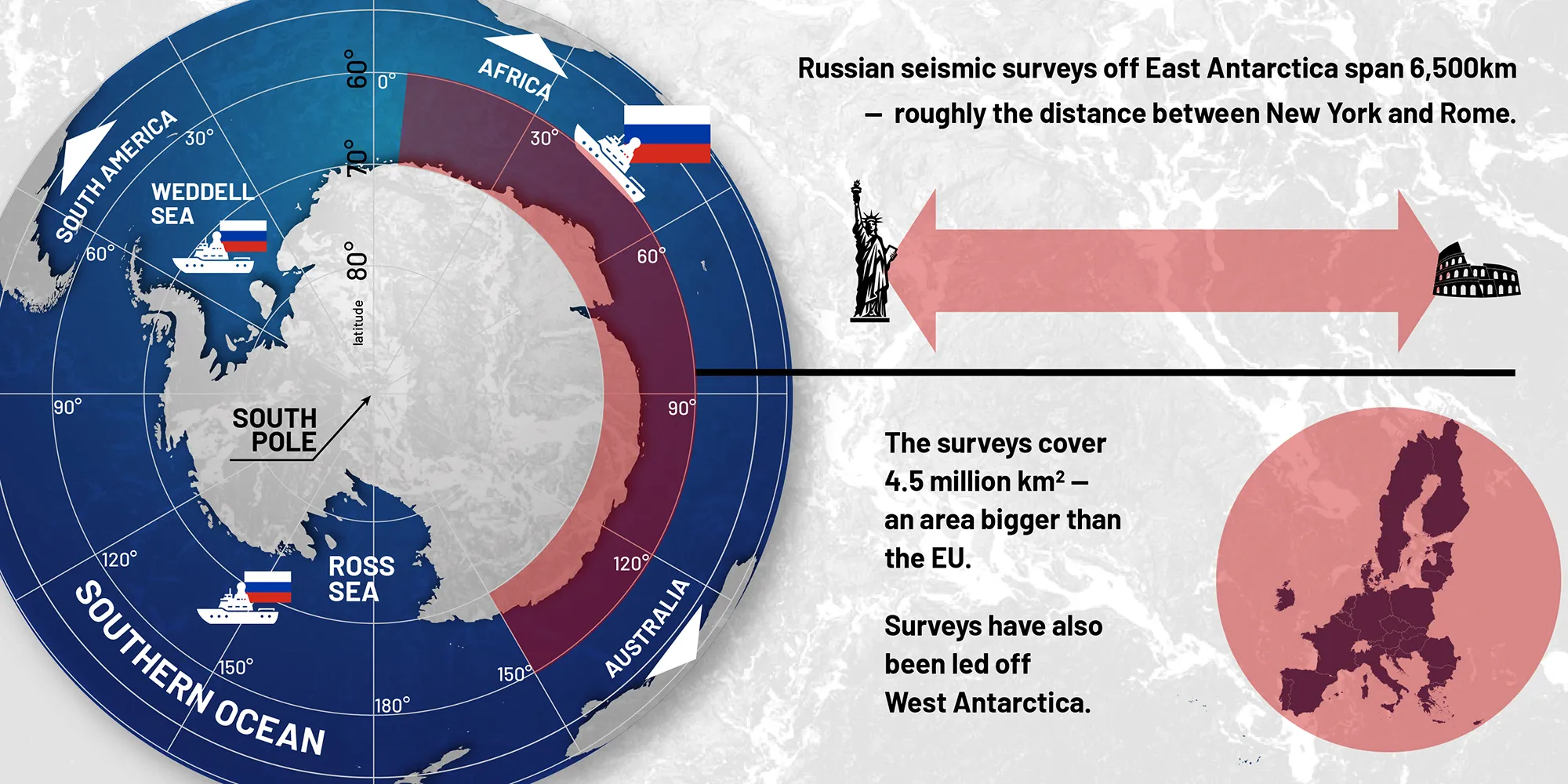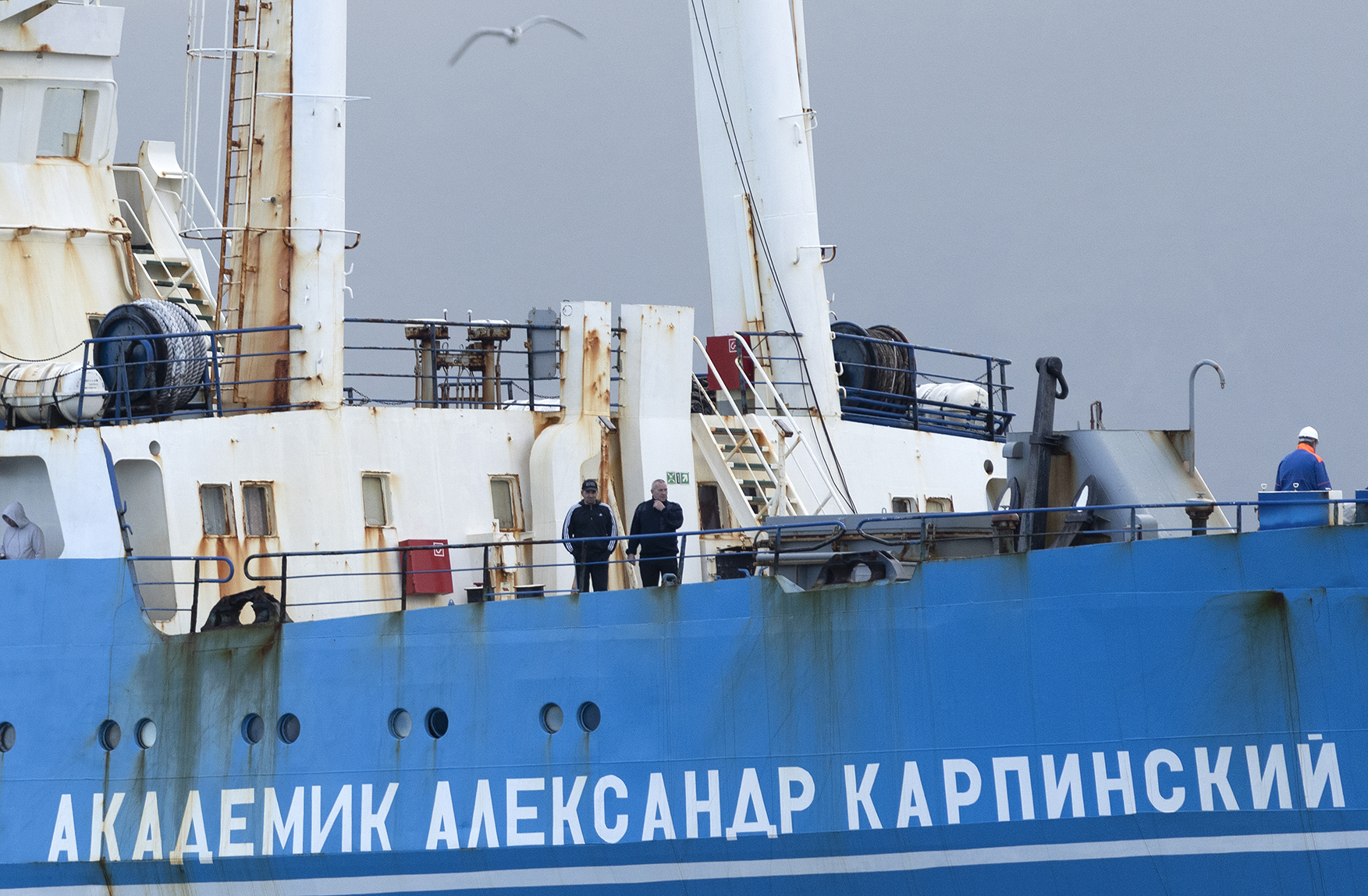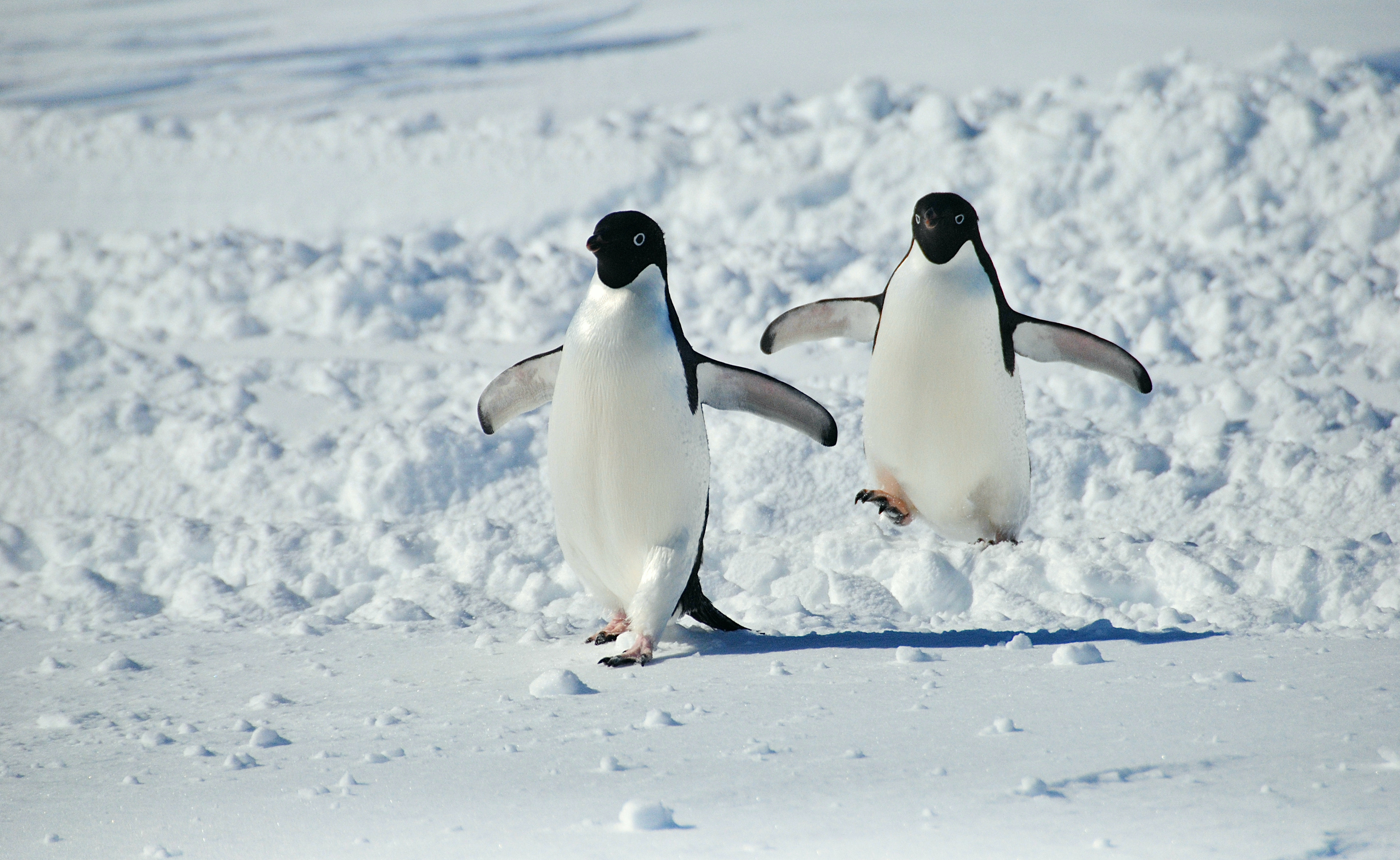BATTLEGROUND ANTARCTICA
US sanctions target Russian ship surveying for Antarctic oil and gas via Cape Town

As revealed by the Lady R saga, fears of secondary sanctions may make it difficult for the controversial polar ship to stop at South African ports in future.
The US has imposed sanctions on a Russian state seismic vessel that has led extensive oil and gas surveys in Antarctica’s Southern Ocean, a marine wilderness threatened by greenhouse gas emissions and extreme weather.
The Akademik Alexander Karpinsky, a dedicated Antarctic research vessel, has produced most of these investigations via Cape Town since an international mining ban became official in 1998.
According to the US Department of State, the Karpinsky was sanctioned to mark two years since Russia’s invasion of Ukraine on 24 February 2022 and the death this month of the opposition leader Alexei Navalny in a Siberian prison.
The Karpinsky, a vessel that has produced seismic data spanning a 4.5 million km² Southern Ocean block, is owned by the Polar Marine Geosurvey Expedition (PMGE). An outfit specialising in research and prospecting activities, the subsidiary is owned by Rosgeo, the Kremlin’s mineral explorer.
In addition to the Karpinsky and its sister vessel, the Professor Logachev, both Rosgeo and its PMGE subsidiary have been placed on the designated list, which includes more than 500 sanctioned persons and entities.
Banned from US ports, transactions
Under the restrictions entering into force from 23 May, US citizens and companies are banned from conducting commercial transactions with the Karpinsky’s owners. The ship will be prevented from calling at US ports.
“There is a clear link between Russia’s authoritarianism, its domestic crackdown on dissent, and its aggression abroad,” the US Department of State said in a statement on 23 February. “Today, we are imposing additional costs on Russia for both its internal repression and foreign aggression.”
The Rosgeo subsidiary is “engaged in mineral exploration and prospecting”, the statement points out, and adds it is “designated for operating or having operated in the engineering sector of the Russian Federation economy”.
The statement identifies the Karpinsky as a PMGE-operated “survey and research vessel” used “for the purpose of geophysical exploration”.
“Rosgeo and its subsidiaries,” the statement adds, “perform a range of geophysical services in the search and exploration of oil and gas fields.”
“We can confirm this vessel we designated last Friday is owned by a subsidiary of Rosgeo, which is the state-owned oil, gas and mining geological exploration [holding]. The US has targeted Russia’s future energy production to further constrain development of future energy and mining projects abroad,” a US official told Daily Maverick via the US embassy to South Africa. “As part of that we identified this ship, and 13 others, as vessels that various subsidiaries of Rosgeo have an interest in. These designations help with compliance so that industry knows which specific vessels are property of Rosgeo or its subsidiaries and therefore fully blocked.”
Associated with serious noise concerns — like other airgunned ships active in the frigid, tempestuous region below 60°S — the Karpinsky has also studied standard geological and geophysical processes.
The Karpinsky’s PMGE sister vessel, the Professor Logachev, was also designated.
Cautionary tails: Lady R’s cat-and-mouse lessons
As noted on the 1959 Antarctic Treaty’s seasonal shipping database, the Karpinsky is registered to sail to West Antarctica’s Amundsen and East Antarctica’s Ross seas for “marine geological-geophysical studies” in the present research season.
It is unclear if the vessel will stop in Cape Town on its return voyage to St Petersburg, its home port. If it does, local shipping agents may refuse to service it for fear of secondary sanctions. Indeed, when the sanctioned Russian military cargo vessel Lady R was snubbed by Ngqura/Port Elizabeth agents in late 2022, the South African defence force redirected it to Simon’s Town — triggering a diplomatic fracas with the US embassy.
Read more in Daily Maverick: New US Bill calls on the Biden administration to review America’s relations with SA
Yet, Professor Donald Rothwell, a polar law specialist, stresses that “US sanctions against the Karpinsky are only applicable in US ports. They do not create legal obligations on other countries.”
Says Rothwell, a professor of international law at the Australian National University: “The US is not a gateway country or port to Antarctica and sanctions on the Akademik Alexander Karpinsky will not immediately impact its ability to sail to and from Antarctica.”
A founding signatory of the treaty — of which the US is the depositary state — Australia has significant heft in the South Pole region. It is an official gateway port.
These restrictions also coincide with ongoing debates about whether Australia should adopt a more independent stance on sanctions, rather than consistently relying on US leadership.
“Australia is currently tightening its sanctions regime against Russian interests, and often mirrors the US sanctions list,” Rothwell observes, “which could impact the ability of the Akademik Alexander Karpinsky to visit Australian ports.”
Professor Alan Hemmings, an Antarctic governance expert at the University of Canterbury, notes that under transport bans in New Zealand’s sanctions, “all Russian and Belarussian military and government-owned or controlled aircraft and ships are banned from New Zealand airspace and waters.
“Aircraft and ships owned, operated or chartered by sanctioned individuals cannot enter New Zealand. So, the Karpinsky will not be able to support its Ross Sea activities from New Zealand.”
‘Scientific’ assessments of Antarctic oil and gas potential
Largely using the Antarctic gateway of Cape Town as a launchpad, the Karpinsky has amassed significant oil and gas inventories — even though the treaty’s environmental chapter bans “mineral resource activities” in its operations area.
The legal text outlawing such operations, called Article 7 under the treaty’s Madrid Protocol, does allow for undefined “scientific research” — and this is exactly what Rosgeo’s PMGE insists it has been doing in both the Southern Ocean’s East and West Antarctic sectors.
However, scientific papers and reports endorsed by the Kremlin and its state entities have also made bold pronouncements on the Antarctic’s oil and gas potential and perceived geopolitical value of hydrocarbons there.
Such data have also suggested that the protocol, signed by 42 states including the US, China, Russia and South Africa, is a “gentleman’s agreement”.
A December 2022 annual report notes the subsidiary’s research goals are “decreed” by the Kremlin and include “the creation of an information base for the assessment and scientific forecast of the mineral raw-material potential of the Antarctic”.
Stating in multiple instances that the Southern Ocean’s sedimentary basins hold 500 billion barrels of oil and gas, the subsidiary in 2016 claimed credit for the “overwhelming majority” of work required to identify Antarctica’s potential supergiant oil fields.
The subsidiary has also charted other types of minerals, an activity that may be shared by other states under Article 7’s research allowances.
The Kremlin’s public reports have never offered oil and gas recoverability estimates — most likely because the southernmost frontier represents some of the most extreme mining conditions on the planet.

Russian seismic surveys in Antarctica since the mining ban entered into force in 1998. (Graphic: Righard Kapp / Daily Maverick)
Destination South America
According to ship tracker Marine Traffic, the Karpinsky was scheduled to call at Montevideo, Uruguay, on Friday, 1 March. From there it would head to the West Antarctic, where its subsidiary has conducted oil and gas surveys and praised the area’s mineral potential.
In 2022, seismic work was led aboard the Professor Logachev, the Karpinsky’s Antarctic sister vessel, in the Weddell Sea off South America — the ocean where Sir Ernest Shackleton’s Endurance ship was tracked down by South Africa’s polar research vessel, the SA Agulhas, in the same season.
“Scientific work was successfully carried out on the geological and geophysical study and assessment of the mineral raw-material potential of the subsoil of the northwestern part of the Weddell Sea,” a report concedes.
Understanding the report’s criteria for success poses challenges — the Logachev had run aground on the Antarctic side of the Drake Passage.
After being refloated by the Argentinian navy, and undergoing a hull inspection in Ushuaia, the Logachev trundled back across the fierce Drake — without “significant” damage to the hull — for more of the same work.
Sanctions: lukewarm effect?
As defined by a controversial 1988 Antarctic mining pact — ultimately abandoned after public protests — “prospecting” aims to identify “areas of mineral resource potential for possible exploration and development”.
Thus, argues Alan Hemmings, Antarctic prospecting is a mineral resource activity outlawed by the ban, because it forbids “any activity relating to mineral resources, excluding scientific research”.
“This was reiterated by treaty states in a resolution in 2023,” Hemmings emphasises.
Read more in Daily Maverick: The price of opposition — Geopolitics and governance gridlock divides Antarctica
However, it is uncertain if the sanctions will affect the ship’s Antarctic operations, says Hemmings. Although Russian state vessels are banned from New Zealand ports, South American gateway ports may be open to them.
“Cooperation between the Russian Federation and most other Antarctic states has already dried up,” Hemmings says. “The Rosgeo-Karpinsky project is anyway an autonomous national strategic project that seemingly does not involve cooperation with anyone, bar port-access arrangements with South Africa.”
The rest of the Russian polar fleet has also used Cape Town for decades, where the Karpinsky’s activities caused protests in 2023.
The sanctions’ success “likely boils down to whether they have any effect in relation to the Karpinsky using South African ports. Perhaps the risk of US secondary sanctions against South Africa will stimulate a reappraisal — but it obviously has not hitherto,” he points out.
Read more in Daily Maverick: Antarctica: A mysterious continent filled with teeming life in need of our protection
Potential future challenges to the Karpinsky’s transit through the South African coastal metropole might be viewed by President Cyril Ramaphosa’s administration “as gratuitous payback from the pro-Israel US, deliberately seeking to use pressure” in the wake of the Gaza Case at the International Court of Justice.
The treaty’s India-hosted May meeting is also unlikely to exert pressure on South Africa, “given the host’s own reservations regarding Russian sanctions”, Hemmings adds.
In early 2022, the Antarctic governance professor led an academic push calling for a “forever”, unchangeable ban on extracting Antarctic oil and gas.
The ban does not expire, but from January 2048 it is possible that a majority of treaty states with decision-making rights may vote to transform it.
Among clearing other major hurdles, a new mining pact would be needed to weaken or reverse the ban, as noted by Professor Klaus Dodds during a new Westminster inquiry on the UK’s Antarctic interests — held in December and February.
Dodds cited the Karpinsky’s activities during his oral evidence.
WATCH: Professor Klaus Dodds, a geopolitics specialist at Royal Holloway, University of London, testifies at Westminster’s inquiry. (Source: Parliamentlive.tv)
Head of Russian Antarctic Expedition: ‘We are no different’
The Karpinsky sails under the flag of the Russian Antarctic Expedition (RAE) — a prominent, founding player of the treaty, which devotes the region to peaceful pursuits such as tourism and science.
Led for decades by the Russian oceanographer Dr Valery Lukin, the RAE is now spearheaded by Pavel Lunev — the PMGE’s director until April 2023.
Lunev previously told us that the subsdiary’s geological and geophysical survey work was “no different” to projects managed by other Madrid Protocol signatories.
During the 2021/22 summer, he said, it probed “the glacial processes, dynamics and evolution of the ice sheet and the stages of Antarctic glaciation”, and “the nature and foundation of the Earth’s crust”.
When pointed to the subsidiary’s April 2022 report , in which it claimed to be gathering data on Antarctica’s “mineral resource potential”, Rosgeo told us: “You will agree it would be illogical to exclude hydrocarbons from consideration … given that they are a natural component of the geological environment.”
The South African Department of International Relations and Rosgeo did not respond to requests for comment. DM





















 Become an Insider
Become an Insider
US: hypocritical, immoral, greed and power driven genocide complicit bully.
They invade countries and then have the audacity to punish and sanction countries that don’t benefit them. Use, abuse and destroy.